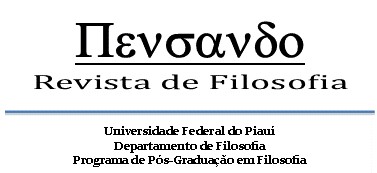Hans Jonas on the perils of progress and the recovery of Metaphysical speculation
Pensando - Revista de Filosofia, Vol.11, n.24, 2020 • Pensando - Revista de Filosofia
Autor: Nicholas Allen Anderson
Resumo:
Hans Jonas’s establishment of an ethics of responsibility entails the simultaneous rejection of the modern notion of progress and the recovery of a form of “metaphysical speculation” that aids man in his search for an objective standard of value. Looking mostly at Jonas’s philosophical biology in The Phenomenon of Life and Mortality and Morality, this paper shows how Jonas’s thought on value judgments rests upon his critique of progress and science. The ethics of perfectibility and progress, Jonas shows, leads to a predicament in which the modern mind must navigate between the dangers present in the hubristic hopes of technological progress and the nihilism he finds in the thought of Martin Heidegger. Jonas’s philosophical biology serves as a critique of these positions that opens up an alternative orientation toward nature—one that grounds not only the ethics of responsibility but the uniquely human activity of reflection. The critique of progress serves, then, as a propaedeutic to the ethics of responsibility and the recovery of an image of man as the reflective animal. Such a recovery of metaphysical speculation from the dogmas of the physical sciences helps encourage a “new humility” in the face of man’s technological power. Jonas hopes to replace man’s desire for self-overcoming with the fear that his “Promethean immoderation” will lead to the biosphere's destruction. This fear acknowledges the limits of man’s knowledge and is thereby accompanied by a posture of Socratic ignorance and the reengagement with the philosophia perennis. That is, a less hubristic ethical theory depends upon a modest philosophical stance toward the whole. Only on the grounds of this epistemological modesty can we hope to proceed into the future with both caution and wisdom.
ISSN: 2178-843X
DOI: https://doi.org/10.26694/pensando.v11i24.11374
Texto Completo: https://revistas.ufpi.br/index.php/pensando/article/view/11374/7064
Palavras-Chave: progress; responsibility; modern science; technology; metaphysical; nature

Pensando - Revista de Filosofia
A revista objetiva ser um espaço editorial de rigorosa discussão filosófica aberto à participação de pesquisadores das mais diferentes regiões do país e do mundo, sem qualquer restrição de ordem temática e teórica, em nível de pós-graduação stricto sensu (doutorado).
La revista pretende ser un espacio editorial de discusión filosófica rigurosa abierta a la participación de investigadores de las regiones más diferentes del país y del mundo, sin ninguna restricción de orden temático y teórico, a nivel de postgrado stricto sensu (doctorado).
This journal claims to be a publishing space of rigorous philosophical debate opened to the collaboration of researchers from worldwide with no restriction of themes and theoretical views, by accepting papers only at the level of graduate studies.
Buscamos ainda disponibilizar a tradução de artigos filosóficos ligados às necessidades da graduação e pós-graduação em filosofia no país, bem como a publicização de filósofos que não são contemplados editorialmente no Brasil.
También buscamos poner a disposición la traducción de artículos filosóficos relacionados con las necesidades de estudiantes de pregrado y posgrado en filosofía en el país, así como la publicación de filósofos que no están cubiertos en Brasil.
The journal also aims to publish Portuguese and Spanish translations of philosophical works related to the needs of philosophy undergraduate and graduate studies in our country, as well as papers of relevant philosophers who were not still published in Brazil.
Queremos também, por fim, ser um espaço para a discussão sobre o ensino de filosofia em seus diferentes graus de ensino, visando sua melhoria através da discussão crítica de alternativas acadêmicas relacionadas ao tema.
Finalmente, también queremos ser un espacio para la discusión sobre la enseñanza de la filosofía en sus diferentes grados de educación, con el objetivo de mejorar a través de la discusión crítica de las alternativas académicas relacionadas con el tema.
The journal claims also to be a place for serious debates concerning teaching philosophy in its several levels, by aiming to improve its practice through the critic discussion of relevant alternatives to the subject.
Publicamos artigos em português, inglês, francês, espanhol e italiano. A publicação e o processo editorial é totalmente gratuito.
Publicamos artículos en portugués, inglés, francés, español e italiano. El proceso de publicación y editorial es completamente gratuito.
We publish papers in Portuguese, English, French, Spanish, and Italian. There is no charges or cost for submission and publication.
QUALIS CAPES 2017-2020: A2
